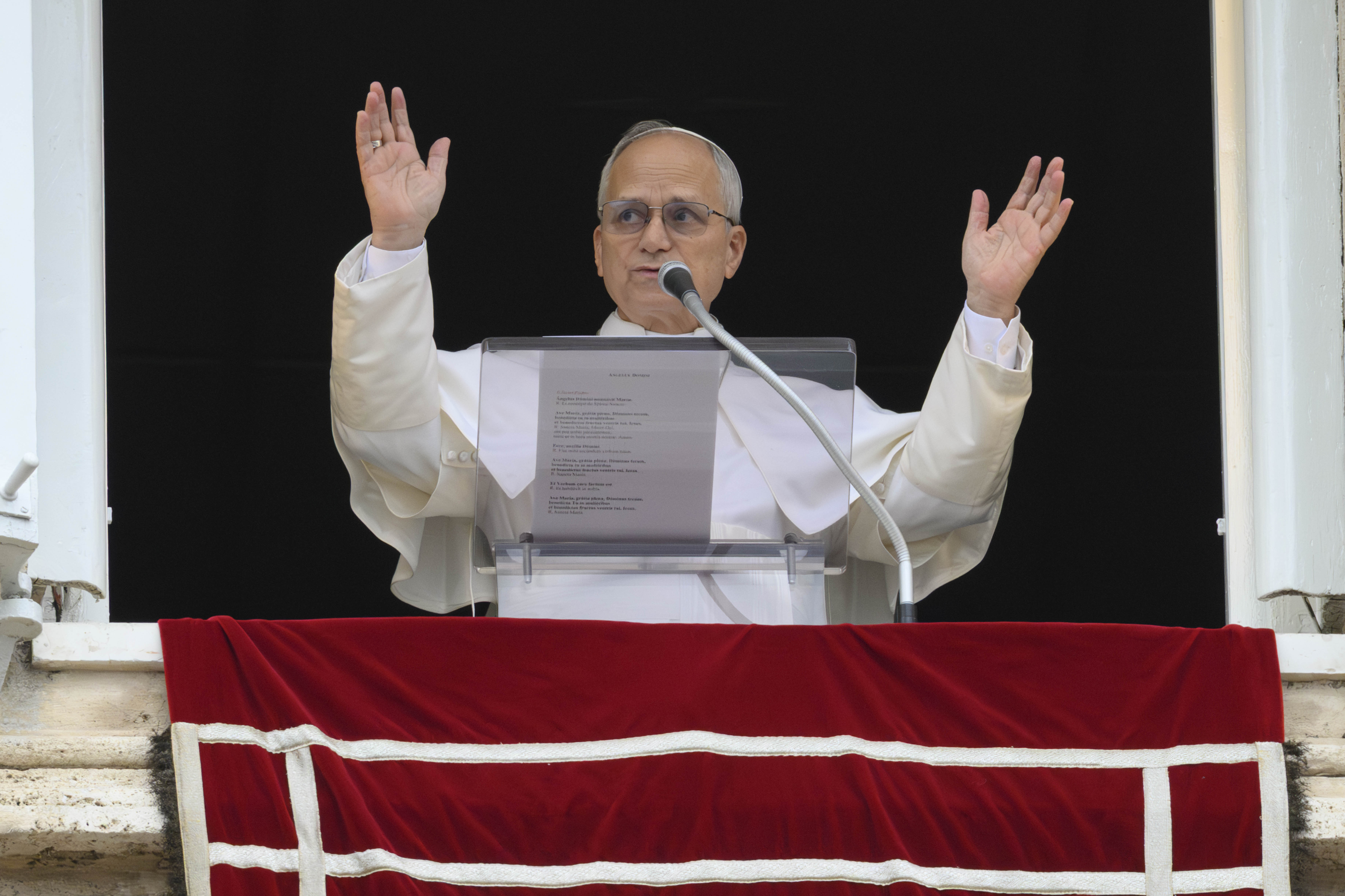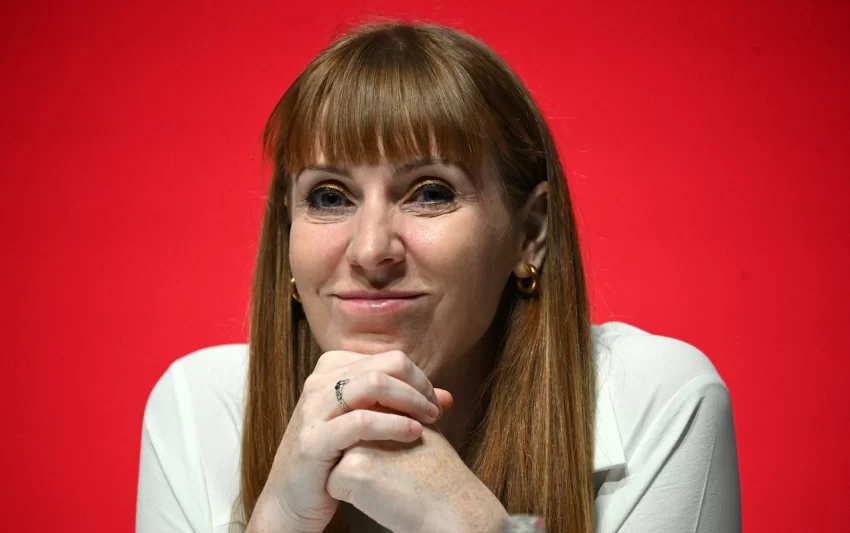Britain’s Keir Starmer, under friendly fire, tries to hoist his flag
LIVERPOOL, England — Last year’s slogan was “change begins.” This year’s will be “renew Britain.” The trouble is, Britain’s prime minister is running out of time to do it.
After months of grappling with rising nationalist sentiment and support for Nigel Farage’s populist Reform UK, Keir Starmer has decided the time has come to be more muscular — and he will use Labour’s annual conference this week to articulate a center-left vision of “patriotic renewal.”
The PM also intends to trumpet achievements from his first 15 months that he and his allies feel have been overlooked, such as a rise in GP appointments; and attempt to tell a story of what his often-promised “delivery” will mean for voters. That will include future-facing policies including the newly announced mandatory digital ID to tackle illegal working.
More policy reveals are expected at the conference ahead of the PM’s keynote speech Tuesday, including on infrastructure and health, senior officials familiar with his thinking told POLITICO.
Yet many of Starmer’s own MPs and ministers are arriving in Liverpool doubtful it will turn the tide of public frustration with Labour.
Starmer won a 174-seat majority in July 2024, yet his administration has been beset by scandals, revamps and resignations of his most trusted aides. Tricky economic decisions have angered pensioners, businesses, farmers and the aid sector. Starmer’s team is already braced for two crisis points — a tax-raising budget on Nov. 26, and Scottish and Welsh elections in May 2026, after which many of his MPs believe he could face a leadership challenge.
A YouGov poll Friday projected Nigel Farage’s populist Reform UK to win 311 seats in a general election (up from five now and just short of a majority), to 144 for Labour. Andy Burnham, the Labour mayor of Greater Manchester who has called for more state spending and wealth taxes, is openly touting himself as Starmer’s successor — his brooding headshot filling the cover of this week’s center-left New Statesman magazine.
In conversations with POLITICO, more than a dozen MPs and officials, granted anonymity so they could speak frankly, revealed a grim mood heading into what is supposed to be a celebratory week in Liverpool.
“I’m gobsmacked that we are in this position 14 months after getting into government, after 14 years in opposition,” said one government minister. “People hate us. It feels like we’ve lost the public.”
Starmer’s ‘actual views’
The PM spent three days this week away from the claustrophobic offices of Downing Street to work on his conference speech at his party’s sleek, modern south London HQ, said three people familiar with the preparations.
While advised closely by his speechwriter Alan Lockey and long-time aide Stuart Ingham, the speech has been driven by Starmer personally and will show his “actual views,” said one person who works with the PM. They stressed it will not simply be the view of his powerful chief of staff Morgan McSweeney — who even allies in Labour believe drives the PM’s ideological and strategic thinking.
A second person who works with the PM said the aim is to “reset this government and its leadership in the eyes of the public and the media.”

His defenders still insist the public’s malaise can be blamed on international currents. A tide of alienation with the establishment, and anger at migration, globalization and inequality, is shaping the narrative in Britain and other Western nations, making governing difficult for anyone in office. “There’s a lack of trust on whether we will deliver things,” said a third person who works with the PM.
Starmer is also expected to attempt something his MPs repeatedly complain he has failed to do — set out a firmer story for the country, to articulate what “delivery” is all for.
‘Patriotic renewal’
But the clearest thread will be patriotism — the Starmer way.
The PM called it “patriotic renewal” Friday, when he previewed this overall theme of the conference two days early at the Global Progress Action Summit of center-left leaders in London.
Speaking there, Starmer contrasted his theory with what he called the “predatory grievance” of a new ascendant right. He said his conference speech will talk about an “open fight now between Labour and Reform” — which he called a “battle for the soul of the country.”
McSweeney is still a driving force overall, despite his reputation being battered by his role in persuading Starmer to hire Peter Mandelson as the U.K.’s (now sacked) ambassador to Washington. He quietly helped arrange the Friday summit and took part in private sessions for political aides Thursday, including with Australian Labor Party Executive Director Paul Erickson.
Starmer’s aides hoped the summit would provide a contrast between the PM as a diplomat and Farage playing politics, much as with Donald Trump’s recent state visit to Britain — which was seen internally as a success, given the president did not erupt at Britain and Farage kept out of the way.
Speaking on stage ahead of a panel with the PMs of Canada, Australia and Iceland, Starmer contrasted himself not just with Reform — but also with Trump, despite the work he’s put in to charm the American. He condemned “lies that have taken root in our societies” including the theory (cited by Trump) that London is a lawless capital.
“This city isn’t the wasteland of anarchy that some would have you believe,” Starmer said, after listing the delights of London in early autumn, and nor is politics a “choice between globalists and nationalists … between the elites and the people.”
Hoisting the flag
Yet the sight of Starmer with center-left leaders plays, too, into Reform’s portrayal of a PM touring the world stage with elites while Britain burns.
And Starmer’s position on patriotism has been forced by events. MPs returned to Westminster after a summer in which nationalists protested against asylum seekers being placed in hotels, and painted the St George’s Cross — the flag of England — on roundabouts and traffic crossings across the country. More than 100,000 people attended a nationalist “Unite the Kingdom” march in London this month, which Starmer said Friday “sent shivers through the spines of many of our communities.”
Black MPs were disappointed at what they saw as the government’s failure to respond confidently, said the Labour adviser quoted above. “There is a level of hate and anger in the country,” this adviser argued. “In the summer we were completely absent and we ceded ground to some quite unpleasant forces.”

Starmer is trying to spell out a more nuanced and heartfelt answer to this than simply painting protesters as racist, which would drive more people into the arms of Reform.
The PM set out his thinking in private meetings with MPs in September. An attendee at one said his view was that Britain needs Labour to step up and pull together, to stop darker forces pulling the country apart.
One backbencher in a seat threatened by Reform welcomed this, saying: “It feels like we’ve been in a defensive crouch all summer. If I lose, I lose — as long as I lose going down fighting.”
Charming the party
Starmer — accused by his MPs of being aloof — has stepped up engagement with his party, having breakfasts with MPs in No. 10 this week, making rare appearances in the Commons smoking room and dining room, and spending two and a half hours at a meeting of Labour’s national executive committee, including a lunch of sandwiches from Sainsbury’s supermarket.
The senior Labour organizer quoted above said: “I think they’ll just want a steady as you go conference with nothing unsettling them. You feel like that’s what Starmer wants all the time.”
But danger moments include Gaza — Starmer last weekend recognized Palestinian statehood, but members will push him to go harder on sanctions and trade embargoes — and party pressure to lift a two-child limit on welfare benefits in a forthcoming child poverty review.
There is quieter discontent among Starmer’s ministers, many of whom were abruptly moved to unfamiliar jobs in a sweeping reshuffle earlier in September — despite the PM promising stable government. Junior ministers were moved “about for no discernible reason” in the way seen under past PMs that “really fucks up government,” said a Whitehall official.
The Labour adviser quoted above suggested the junior reshuffle was the “brainchild” of McSweeney and his ally Matthew Faulding, the head of Labour’s PLP office who announced his exit this week, to promote loyalists. They added: “The whole thing was fucking bonkers. We have thrown the board up in the air and hoped all the pieces work out. Either it’s going to be chaos or it’s going to be brilliant.”
Missions: Impossible
The reshuffle put Darren Jones, the PM’s ally and Whitehall enforcer, in charge of “delivery” of his flagship missions for government. Cabinet Office functions are in the process of being reorganized to lessen the duties that come with his brief of Chancellor of the Duchy of Lancaster, such as national security.
“Mission delivery” has moved from an obscure position in the Cabinet Office to Downing Street, though what form it takes is still being worked out. Starmer’s “mission boards,” which had been chaired by individual Cabinet ministers to track progress, have not met since the summer, said one person familiar with them.
Many in Labour are disillusioned with this incrementalist approach. One person who speaks regularly to No. 10 said: “If your car becomes 5 to 10 percent more fuel efficient but you still don’t have a map, you’re no better off.”
Part of Starmer’s answer is digital ID, but this brings a danger too.

One Labour MP said the demographics of those opposed to ID schemes were nothing like two decades ago, when many protests came from civil liberties groups on the left. “All of the traffic I’m getting is from the right,” they said. “They think it’s going to be an authoritarian tool for Keir Starmer to enforce his two-tier policing.” Farage has already played into this, saying the scheme will not stop migration and be merely about “controlling the population and telling us what we can and can’t do.”
Aides’ internal focus in the weeks leading up to this conference was on three words — “fairness,” “contribution” and “renewal” — which were broadly driven by three think tanks close to Labour: the Institute for Public Policy Research, Labour Together and the Tony Blair Institute respectively. Starmer’s focus moved away from “contribution” and firmly onto “renewal.”
But one Labour adviser said: “We don’t need more abstract nouns — we can’t end up with more words and not a story.”
A senior party organizer added: “The biggest issue remains, what is it all for? There’s no sense of overriding project that we’re all working towards and that’s why the public is restless.”
Landmines ahead
Aides are already looking beyond this week.
Starmer has been rolling the pitch for a difficult budget on Nov. 26. The cost of living is still the number one issue (alongside migration) for many voters, and the PM suggested Friday that Chancellor Rachel Reeves will focus on growth that “can’t be a line on a graph” but is distributed evenly across the country. He added: “We for too long lost our way. We thought redistribution was the only thing that mattered for fairness.”
A more prosaic hurdle awaits No. 10 too — the publication of “The Fraud,” a book by the journalist Paul Holden based on leaked internal documents from the time of the rise of McSweeney and Starmer. It is due out on Nov. 13, but the e-book is scheduled to arrive in mid-October.
The book has already forced the departure of Paul Ovenden, Starmer’s political strategy director, over messages he sent in 2017 repeating sexual imagery about the MP Diane Abbott. It will renew focus on an old row involving £700,000 in late-declared donations to Labour Together, the vehicle McSweeney used to propel Starmer to the leadership.
The Electoral Commission on Friday decided not to mount a further investigation into Labour Together, after the Conservative Party obtained leaked legal advice around the donations. A Labour spokesperson said the Tory attacks had been a “pathetic and desperate attempt to stay relevant” and “the Electoral Commission considers this matter closed.”
Holden, however, insisted there will be “considerably new information” in his book on the donations row. Holden — a former Labour member who voted for the party under past leaders Gordon Brown, Ed Miliband and Jeremy Corbyn — added his book will touch on “quite a substantial range of people” including elected politicians. He told POLITICO: “There is some serious misconduct and wrongdoing that I think is genuinely shocking.”
Any more departures would be a blow to Starmer, who has already been losing other trusted, long-serving staff. In the last week, Faulding and the PM’s Director of Communications Steph Driver both announced their exits.
McSweeney, who has been key to Starmer’s rise, remains firmly in place. One Labour official said: “If he gets rid of Morgan, he’s done.”
Labour’s finances are meanwhile in what one senior party figure called a “perfect storm,” one year after a costly election campaign, with the membership numbers slipping, donors hesitant and unions giving little money beyond their baseline affiliation fees.
A person familiar with the accounts said Labour is currently running a deficit of around £3 million. A Labour spokesperson declined to comment on internal figures. Previously published accounts showed the party planned to run a £1.7 million deficit in 2024.
King over the water
Into all this will land Burnham, who is working with Mainstream, a newly-formed campaign pushing for an alternative vision to Starmer’s government.
Neal Lawson, a veteran activist who is helping run Mainstream, told POLITICO Burnham “had nothing to do with the organization of it.” But the name provocatively implies Starmer does not represent Middle Britain.
Condemning Starmer’s direction, Lawson said: “The underlying foundations of this project are so weak that it endangers the future of the Labour Party and brings with it the threat of a Reform government.” Britain needs a movement with “charisma and vision,” he added, but “I think this project is devoid of any of that. For me it was always a question of when it would crash and burn, not if.”
It is easier to topple the PM than it once was, after Labour changed the rules to allow a leadership challenge from MPs at any time of the year.
Yet it would be at risk of early leak and sabotage. Unlike the Conservatives, where generic “no confidence” letters are all held confidentially by a senior MP, any Labour challenger to Starmer has to find 80 MP supporters on their own initiative. The challenger will need to write with supporters to Labour’s general secretary — but even some senior officials are still unsure of the exact process.
“If you come for the king, you’d better not miss,” said the minister quoted above. “You need to have 80 people ready to go.”
‘May is the season finale’
Starmer is being saved (for now) by the lack of one obvious successor. A second Labour organizer said: “I am surprised though by how much anger there is, including from very senior people. The thing that holds them back is ‘what next?’”
But MPs have been extremely vocal to whips and No. 10 in private. “Everyone’s accepted May is the season finale,” said a second Labour adviser. “They are both that angry and that stupid.”
It is barely two weeks since Starmer launched “phase two” of his government. For many MPs, it already feels like phase three.
So what next?
In a darkly comic coincidence, “Phase IV” is the name of a 1970s cult horror film in which humanity is subjugated by a colony of hyper-intelligent ants. A third Labour adviser said: “I’m actually looking forward to that bit. I won’t have to think about all of this.”




















:quality(85):upscale()/2023/09/18/918/n/1922398/a1136b676508baddc752f5.20098216_.jpg)
:quality(85):upscale()/2025/10/09/670/n/1922283/00b944c868e7cf4f7b79b3.95741067_.jpg)
:quality(85):upscale()/2025/10/15/765/n/1922398/29c37a6e68efd84bb02f35.49541188_.jpg)
:quality(85):upscale()/2025/09/09/891/n/1922283/7222624268c08ccba1c9a3.01436482_.png)
















